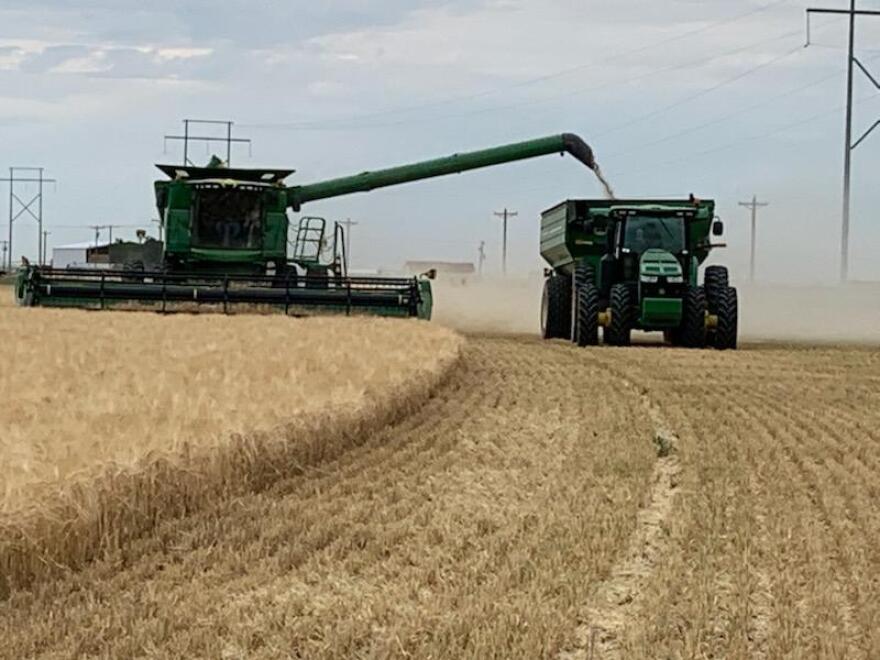Marc Arnusch uses science to get the most out of his 5,000 acres in Keenesburg, Colorado. Seed wheat, seed barley and a handful of grains for the craft beer and spirits industry make up his usual rotation. The third generation farmer's wheat harvest was so exceptional this fall, he simply couldn’t keep it close to the vest. He entered his crop in the National Wheat Yield Contest.
"We've been participating just about each and every year," Arnusch said. "It allows you to really try some new, innovative things in the field. It pushes you to find the outer bounds of yield, quality, management."
In the end, Arnusch came out with first place in the nation in the "Yield Over County Average" category, which rewards the farmer whose yield beats the average in their home county by the biggest margin.
Arnusch ended up hauling in more than 130 bushels per acre this summer, beating the Weld County average yield by about 330% and earning him top honors nationwide.
"We harvested the best dryland wheat crop in my family's history this year,” Arnusch said, adding that his average harvest is usually around 30 or 40 bushels per acre. “Certainly, the rainfall in the spring was the biggest shot in the arm, but we had a good fall.”
He also credits his success to careful seed variety selection and his use of science and innovative seed treatments.
The wheat yield contest, which began in 2016, is an opportunity for wheat farmers across the country to compete and share information. The winners speak at webinars and are sought out by peers to answer informal questions about what practices were most successful. It’s a rare opportunity for glory in the often obscure and thankless work of growing wheat to nourish the world.
Anne Osborne, project manager with the National Wheat Foundation that holds the annual contest, said the goals of the event are to improve the productivity, quality and marketability of the U.S. wheat crop.
“We want to educate and communicate to all segments of the wheat industry the importance of yield, quality and profit,” she said. “Out of the yield contest winners, we look at: What are they doing? And how can we share those best management practices so that people can learn from that and do, do that on their own farms.”
Osborne said the results from this year’s contest, which had about 150 entries, were unusual. She did not expect to find three farmers from arid Colorado – all from Keenesburg - among the national winners.

“That’s sort of surprising,” she said.
Arnusch’s green thumb seems to run in the family. His son Brett Arnusch, who also works on the family farm, took home second place in the "Yield Over County Average" category.
A third Keenesburg farmer, Casey Cantwell, won fourth place in the same category, with just under 100 bushels per acre.
The Keenesburg winners' successes this year were likely due to an unusually wet growing season, but also because they’ve been early adopters of more sustainable farming methods.
“They wouldn't be getting these yields if they weren't doing things that are conserving, especially (in) eastern Colorado and western North Dakota where rainfall is so precious,” Osborne said. “These growers are doing things like minimum till or no-till, or soil health practices that are very sustainable for their farms and their families.”
Arnusch said he’s especially thankful for this year’s great outcome because it comes on the heels of a few terrible drought years.
“Last year, in 2022, was actually the worst crop we’ve ever had for wheat,” Arnusch said, citing punishing drought conditions during the previous growing season. “Farming in a state where drought is around every corner, it's nice to see that it can find its way to rain again.”
This year, he said everything fell into place perfectly. For a brief window this summer, drought conditions lifted across the state for the first time in several years.
The winners' prize is a full ride to next year’s Commodity Classic, a national agriculture convention, where the farmers will be honored at a winners’ reception and share the secrets of their success with peers.
Arnusch said there’s no guarantee he’ll be able to repeat his win next season – to some extent, that depends on what falls from the sky.
“Having the kind of crop that we had this last year is pretty humbling,” he said. “It's easy to remember the bad crops that we have. It's sometimes hard to remember the good ones, and we're really going to cherish and feel blessed for a year like 2023.”






